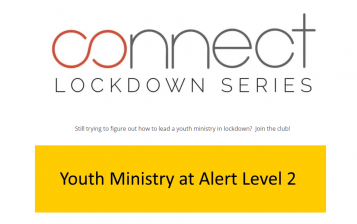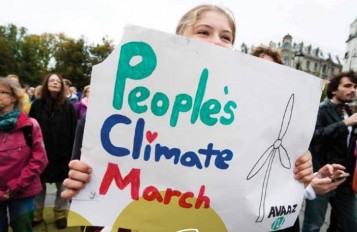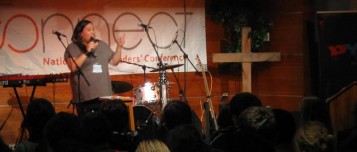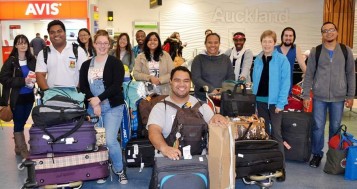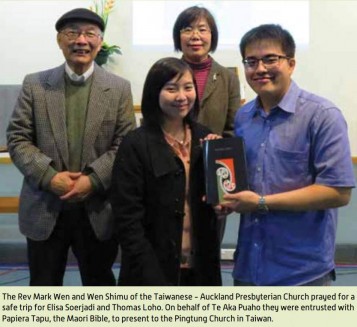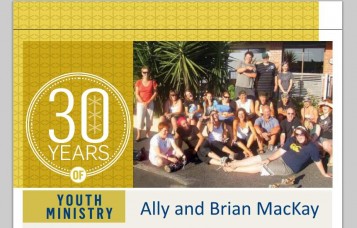Young Presbyterians, like many other Christians, are concerned that we are not being stewards of the earth as Christians are called to be. They are educated and active about this century’s burning issue: climate change and the environment.
On 12 December when the UN Paris conference began, 600,000 people worldwide demonstrated against what they considered as a too-weak treaty on climate change. Two weeks earlier, the biggest People’s Climate March in New Zealand’s history had a strong presence of young people from the combined churches.
Rev Jordan Redding, 25, is a newly ordained minister at Hope Church. Climate change is a big focus of Jordan’s faith journey and he took part in the Christchurch march. He also contributed to the Presbyterian Church’s 2015 submission to the government on post- 2020 climate change targets. Paris was significant, he reflects, but our government’s response was disappointing.
“Their view is that we’re not contributing that much to climate change. I don’t think that’s an excuse as New Zealanders are living unsustainably. If everyone adopted our lifestyle the world would be in serious trouble,” he asserts. “We need ongoing public pressure to force a change in priorities. Likewise in the Church there’s concern but little action. Protesting is viewed with suspicion as being ultra-left or too hippy.”
Jessie Boston, 23, is a member of St John’s in the City and took part in the Wellington march. “I’m passionate and want to get people impassioned,” she says. “Unless you’re a climate change sceptic you should be active. It’s a sad thing that something drastic will need to happen before people change, and by then it will be too hard.”
The climate change march wasn’t just about energy, she says. “It’s about how we do life and respect others around us. One of the key issues for this generation is the disconnect between God and the Church and also from the earth – from the food we eat, our clothing sources and the impact of our actions.”
Jessie works for a funeral company and sees people opting for greener alternatives, such as cardboard coffins. Both Jessie and Jordan agree that millennials are becoming well-informed consumers.
“We’re putting more pressure on suppliers and are better informed about where things come from,” she says. “There’s more transparency now than before. And also some resentment that not enough has been done by our elders – they’ve handed over a planet that’s no longer habitable.”
Jessie is inspired by mentors in older generations, such as her parents and world leaders, but expects more from the Church.
“God gave us a magical playground and we’re causing such harm to it. The Church should be right at the front of that battle to protect it. Instead, it has stood back and waited for others and then come in behind. Divesting from fossil fuels is a good step, but we could be more intentional and take a lead, by investing in sustainable energy for example.”
In 2014, the General Assembly asked the Church Property Trustees to divest from fossil fuel investments. Individual congregations were encouraged to do the same with their own investments. The Church Property Trustees are yet to make a decision.
At a regional level more could be done, says Rev Cate Burton, St Peters in the City Tauranga assistant minister. Cate, 29, was one of six young people funded by the Church to attend the 2016 Ecology and Hope Conference, held at Carey Baptist College, Auckland in January. Academic in focus, the conference was light on practical ideas but challenging theologically, she says.
“I loved the idea of ecological readings [of Scripture],” she says. “Like in Jeremiah, God stirring up the oceans. What if God is being playful? It’s like feminist readings of Scripture, you have to delve into what’s not explicitly stated and see it with fresh eyes.”
Cate says that more work is needed to integrate the theological with the practical. She points to a collaborative project in Tauranga between the church and the Good Neighbour Trust to build community gardens.
“In the past year two gardens have been started, at Bethlehem and Welcome Bay,” she says. “I’ve just suggested to my senior minister that we should also be thinking about eco design in the building projects that are coming up in Tauranga.”
Hannah North, 20, of Mahurangi Church put her hand up for the Ecology and Hope Conference to find out more about how faith, theology and conservation can work together. The day, she says, gave her a wider stance on the intrinsic ethics of conservation.
“I already felt we’re conserving the land, plants and animals for future generations, but the conference pushed me to see ecology as God’s creation, so why would we destroy it?” There were further challenges for her related to eschatology. “We discussed secularism versus theology and different views about ecology, how the eschatology of the coming of the kingdom affects the way we treat the earth,” she explains. “If it’s not going to last, is there a point to conservation?”
Hannah also studied at Laidlaw in 2015 and has been active in local conservation projects such as tree planting at Tawharanui Regional Park. Hannah will be preaching at her church in Mahurangi in March on ecology. She sees the Church as lacking sufficient emphasis on its relationship to the land. An increased focus, she says, could bridge the gap between generations and bring more young people into the Church.
“Even though the connection should be a two-way street, we want to be met where we are.”
For the first time the World Economic Forum survey on Global Risks identified the top risk to the global economy as “failure to prepare for climate change”. In New Zealand only 23.9 per cent mentioned this top risk as a factor.
“The Kiwi dream is having a beach house, an SUV and motor boat,” says Jordan. “It’s almost taboo to impose on that. Until coastal areas submerge or the dairy industry suffers I don’t think we’ll see significant change.”
Ally Graves, 18, of St Albans Presbyterian Palmerston North, who also attended the Ecology and Hope conference, says climate change is “the elephant in the room” for Kiwis. “I don’t think Paris achieved much and New Zealand’s reaction is pathetic, ignoring agriculture because that’s our economic base,” she says. “Farming isn’t being done sustainably in this country. The older generation is doing what it’s always done. People need to be more aware and take a stand, to change their lifestyle and stop buying products that cause harm.”
Ally has been a vegan for the past eight years and became involved in environmental issues through her stance on eating meat. A student at Laidlaw, Ally attended the conference out of concern that the Church hasn’t addressed environment and faith.
“Christians have the view that God will provide,” she says, “but there needs to be a stronger, more vocal Christian perspective and more done to inform people. God has given some of us the passion to fix things, not to be passive.”
Liam Boardman, 20, of the Village Church Christchurch, also attended the Ecology and Hope conference. Liam is studying history and political science at Canterbury University and sees the Church as being in a formative stage of responding to climate change.
“There’s always been support for poverty and weakness but issues affecting the environment have been sidelined because of the tension between science and religion,” he thinks. “We shy away from a deeper analysis in case the facts of science collide with our faith. We want to reject the bits that don’t fit our beliefs, and don’t know how to support climate change work while keeping within the wheelhouse of our faith.”
A talk at the conference by Caritas, demonstrating the disproportionate effect climate change is having on Pacific nations and the poor in general was, for Liam, an obvious way to connect the environment with the Church’s traditional concern with poverty and overseas mission. He sees the Catholic Church as being further advanced in synthesising this relationship, particularly through the papal encyclical published last year. The encyclical is in line with the Church’s submission to the government on the consultation for setting New Zealand’s post-2020 climate change target.
The main issue says Elissa Shaw, 18, also of the Village Church, is finding the balance between development and sustainability. Elissa has been working on transitional projects in Christchurch following the earthquakes. Working with Gap Filler and Greening the Rubble has given her an insight into the connection between nature and hope. “Hope is in taking action,” she says.
Elissa agrees with Jordan that the millennials either have post-modern malaise and are giving up because it is too hard, or they are taking the issue of planetary survival seriously. Conference keynote speaker Professor Celia DeaneDrummond was helpful, she explains, in offering novel ways for activists to attract attention.
“She told us about Oil Free Otago, who held a funeral for fossil fuels outside an oil exploration meeting, which was cool and different. She gave me hope by showing that people were doing things at grass roots level that made a difference.”
Dr Andrew Shepherd is national co-director of A Rocha Aotearoa NZ, the Christian-based charity focused on conservation. He was one of the speakers at the Ecology and Hope conference. The biggest issues of our time, he says, are ecology and economic inequality and young people will be the ones to face the realities of what’s being described as “the 6th great extinction”.
“They’re already switched on because the issues are upfront and central in their education,” Andrew says, “but they lack the freedom to respond as they don’t have agency within the Church body, which tends to see ecology as tangential.”
Andrew believes that this theological dissonance between the education system and the Church on ecology is one of two key challenges for young people. The second, he says, is the effects of the digital age and consumption.
“I’m concerned that young people’s attachment to their screens puts them at risk of their imaginations of what the world could be becoming emasculated by large consumerist corporations dominating their thinking,” he explains. “Hashtag activism” is a term coined for being politically active on social media. This kind of activism is often judged as narcissistic or lazy. “Liking a post on Facebook or signing an online petition doesn’t change much or count as action,” says Michael Jessup, 18, who has just graduated from Year 13 at Pakuranga College and attends St Andrew’s Howick.
He was a member of the student-initiated Environmental Council and attends Auckland Council’s Make a Difference (MAD) leadership programme that nurtures MADsters. One of his passions is to make environmental videos and post them online. He entered a three-minute clip on marine litter into a competition run by the Foundation for Environmental Education and was invited to present it at a conference in Cyprus in October 2014, with 40 other young people.
“I thought the international arena would be way better,” he reflects, “but the stuff they were talking about isn’t new. It made me realise New Zealand is at the forefront of environmental action.”
Euan Nisbet, 18, also of St Andrew’s and also on the Environmental Council is now studying sustainable agriculture at Massey University. He supports Michael’s awareness work but prefers to do practical projects. For the past couple of years Euan has been involved through his local scout group with planting native trees on Motuihe Island in the Hauraki Gulf. The Motuihe Trust and DOC have been reforesting parts of the island since 2003 and have released rare native bird species on the predator-free island.
He gets hope from walking along parts of the reforested island and seeing how much the first plantings have already grown. “You see the end game and the impact. It’s not such a hard thing to do, to plant trees,” he points out.
Hope, says Andrew Shepherd, is what the Church needs to be instilling in young people. “We need a theology that fires their imagination, so they become people of hope. Christianity can bring a unique element to ecological issues by telling a story than inspires ultimate hope in God’s greater purpose.”
Jordan Redding sees the Church’s unique role as providing a moral story that inspires everyone to take responsibility for our earthly existence.
“When I read the Scripture I see Jesus helping us to reconcile and renew God’s good creation, not helping us to escape. Jesus was resurrected in body and was concerned with earthly restoration, so the story of Christ gives us hope that God’s creation can be restored,” he explains. “The language of lament and confession also speaks powerfully. ‘We got things wrong and we’re sorry. Help us transform and participate in something new’.”
Jade Reidy – Autumn edition of Spanz magazine.


